Religio Medici and Urne-Buriall 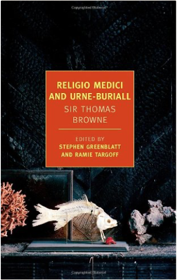 Here this baroque master’s two most enduring and admired works, Religio Medici and Urne-Buriall, appear in a new edition that has been annotated and introduced by the distinguished scholars Ramie Targoff and Stephen Greenblatt (author of the best-selling Will in the World and the National Book Award–winning The Swerve). In Religio Medici Browne mulls over the relation between his medical profession and his profession of the Christian faith, pondering the respective claims of science and religion, questions that are still very much alive today. The discovery of an ancient burial site in an English field prompted Browne to write Urne-Buriall, which is both an early anthropological examination of different practices of interment and a profound meditation on mortality. Its grave and exquisite music has resounded for generations. Hamlet in Purgatory 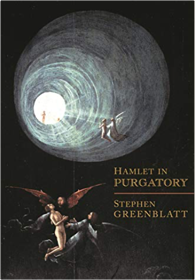 Hamlet in Purgatory: Expanded Edition 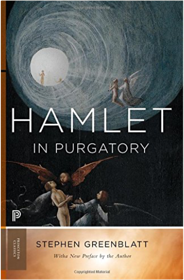 In the mid-sixteenth century, English authorities abruptly changed the relationship between the living and dead. Declaring that Purgatory was a false "poem," they abolished the institutions and banned the practices that Christians relied on to ease the passage to Heaven for themselves and their dead loved ones. Greenblatt explores the fantastic adventure narratives, ghost stories, pilgrimages, and imagery by which a belief in a grisly "prison house of souls" had been shaped and reinforced in the Middle Ages. He probes the psychological benefits as well as the high costs of this belief and of its demolition. With the doctrine of Purgatory and the elaborate practices that grew up around it, the church had provided a powerful method of negotiating with the dead. The Protestant attack on Purgatory destroyed this method for most people in England, but it did not eradicate the longings and fears that Catholic doctrine had for centuries focused and exploited. In his strikingly original interpretation, Greenblatt argues that the human desires to commune with, assist, and be rid of the dead were transformed by Shakespeare—consummate conjurer that he was—into the substance of several of his plays, above all the weirdly powerful Hamlet. Thus, the space of Purgatory became the stage haunted by literature's most famous ghost. This book constitutes an extraordinary feat that could have been accomplished by only Stephen Greenblatt. It is at once a deeply satisfying reading of medieval religion, an innovative interpretation of the apparitions that trouble Shakespeare's tragic heroes, and an exploration of how a culture can be inhabited by its own spectral leftovers. This expanded Princeton Classics edition includes a new preface by the author. The Norton Anthology of English Literature 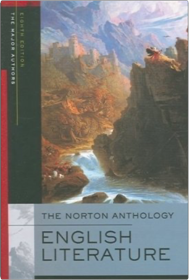 The Norton Anthology of English Literature 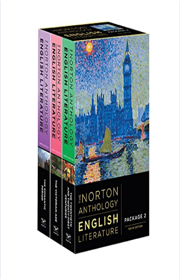 The Norton Anthology of English Literature 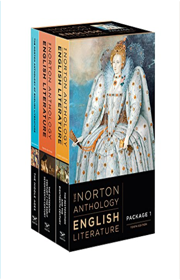 The Swerve: How the World Became Modern 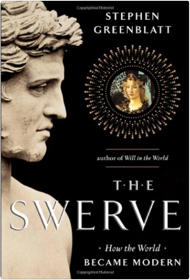 Nearly six hundred years ago, a short, genial, cannily alert man in his late thirties took a very old manuscript off a library shelf, saw with excitement what he had discovered, and ordered that it be copied. That book was the last surviving manuscript of an ancient Roman philosophical epic, On the Nature of Things, by Lucretius—a beautiful poem of the most dangerous ideas: that the universe functioned without the aid of gods, that religious fear was damaging to human life, and that matter was made up of very small particles in eternal motion, colliding and swerving in new directions. The copying and translation of this ancient book-the greatest discovery of the greatest book-hunter of his age-fueled the Renaissance, inspiring artists such as Botticelli and thinkers such as Giordano Bruno; shaped the thought of Galileo and Freud, Darwin and Einstein; and had a revolutionary influence on writers such as Montaigne and Shakespeare and even Thomas Jefferson. 16 pages full-color illustrations Tyrant: Shakespeare on Politics 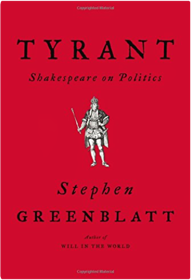 As an aging, tenacious Elizabeth I clung to power, a talented playwright probed the social causes, the psychological roots, and the twisted consequences of tyranny. In exploring the psyche (and psychoses) of the likes of Richard III, Macbeth, Lear, Coriolanus, and the societies they rule over, Stephen Greenblatt illuminates the ways in which William Shakespeare delved into the lust for absolute power and the catastrophic consequences of its execution. Cherished institutions seem fragile, political classes are in disarray, economic misery fuels populist anger, people knowingly accept being lied to, partisan rancor dominates, spectacular indecency rules―these aspects of a society in crisis fascinated Shakespeare and shaped some of his most memorable plays. With uncanny insight, he shone a spotlight on the infantile psychology and unquenchable narcissistic appetites of demagogues―and the cynicism and opportunism of the various enablers and hangers-on who surround them―and imagined how they might be stopped. As Greenblatt shows, Shakespeare’s work, in this as in so many other ways, remains vitally relevant today. Will in the World: How Shakespeare Became Shakespeare 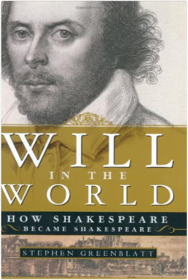 Will in the World interweaves a searching account of Elizabethan England with a vivid narrative of the playwright's life. We see Shakespeare learning his craft, starting a family, and forging a career for himself in the wildly competitive London theater world, while at the same time grappling with dangerous religious and political forces that took less-agile figures to the scaffold. Above all, we never lose sight of the great works―A Midsummer Night's Dream, Romeo and Juliet, Hamlet, Macbeth, and more―that continue after four hundred years to delight and haunt audiences everywhere. The basic biographical facts of Shakespeare's life have been known for over a century, but now Stephen Greenblatt shows how this particular life history gave rise to the world's greatest writer. Bringing together little-known historical facts and little-noticed elements of Shakespeare's plays, Greenblatt makes inspired connections between the life and the works and deliver "a dazzling and subtle biography" (Richard Lacayo, Time). Readers will experience Shakespeare's vital plays again as if for the first time, but with greater understanding and appreciation of their extraordinary depth and humanity. A Best Book of the Year: The New York Times 10 Best Books of 2004; Time magazine's #1 Best Nonfiction Book; A Washington Post Book World Rave ; An Economist Best Book ; A San Francisco Chronicle Best Book; A Christian Science Monitor Best Book; A Chicago Tribune Best Book; A Pittsburgh Post-Gazette Best Book ; NPR's Maureen Corrigan's Best. 16 pages of color illustrations Shakespeare's Montaigne: The Florio Translation of the Essays, A Selection 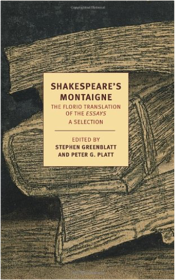 Shakespeare, Nietzsche wrote, was Montaigne’s best reader—a typically brilliant Nietzschean insight, capturing the intimate relationship between Montaigne’s ever-changing record of the self and Shakespeare’s kaleidoscopic register of human character. And there is no doubt that Shakespeare read Montaigne—though how extensively remains a matter of debate—and that the translation he read him in was that of John Florio, a fascinating polymath, man-about-town, and dazzlingly inventive writer himself. Florio’s Montaigne is in fact one of the masterpieces of English prose, with a stylistic range and felicity and passages of deep lingering music that make it comparable to Sir Robert Burton’s Anatomy of Melancholy and the works of Sir Thomas Browne. This new edition of this seminal work, edited by Stephen Greenblatt and Peter G. Platt, features an adroitly modernized text, an essay in which Greenblatt discusses both the resemblances and real tensions between Montaigne’s and Shakespeare’s visions of the world, and Platt’s introduction to the life and times of the extraordinary Florio. Altogether, this book provides a remarkable new experience of not just two but three great writers who ushered in the modern world. |


Delicious Library
Collection Total:
3,499 Items
3,499 Items
Last Updated:
Apr 20, 2024
Apr 20, 2024
 Made with Delicious Library
Made with Delicious Library